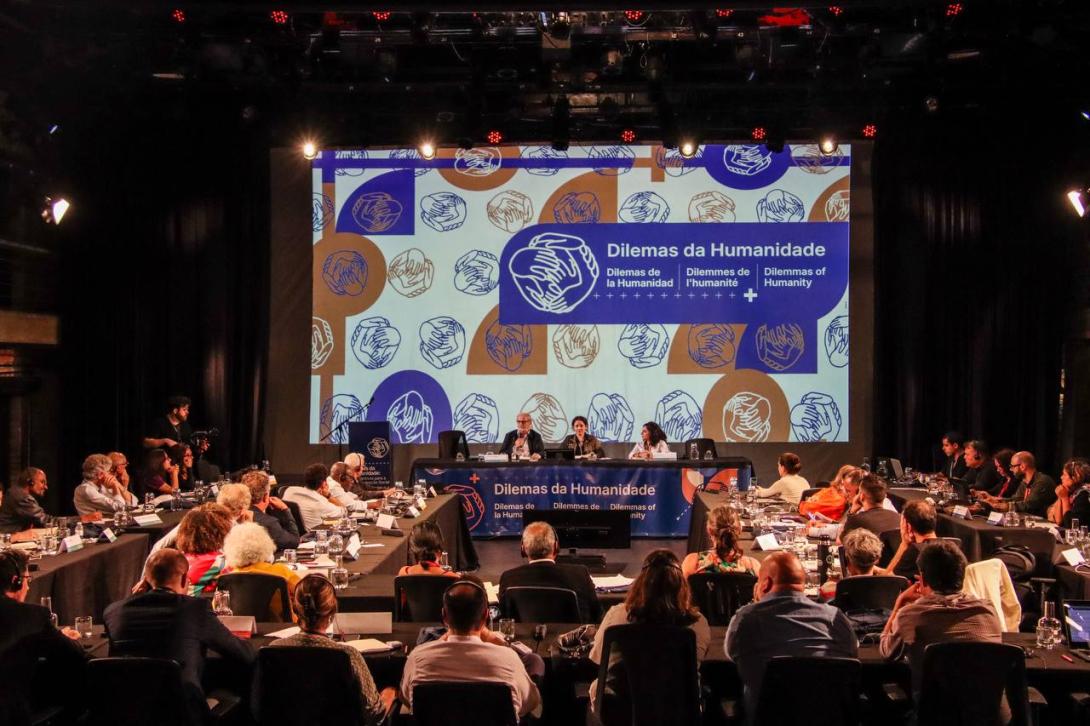“It is necessary to continue building Dilemmas of Humanity with optimism and serious proposals”

En el día de cierre de la IV Conferencia Dilemas de La Humanidad, a modo de conclusión del debate, participaron de la mesa João Pedro Stedile y Juliane Furno. Foto: Priscila Ramos
The final panel of the conference provided a synthesis focused on the need to build on the work developed throughout the IV Dilemmas of Humanity Conference.
On the closing day of the IV Dilemmas of Humanity Conference, João Pedro Stedile, economist, founder, and member of the national leadership of the Landless Workers’ Movement (MST); and Juliane Furno, professor at the Faculty of Economics at the State University of Rio de Janeiro (UERJ), researcher at the Tricontinental Institute, and militant of the Brazil Popular Movement, participated in the final panel to present a synthesis. Their closing remarks focused on the need to continue building on the work developed during the panels.
The goal is to continue building the Dilemmas of Humanity process with optimism and with serious proposals, as it is essential to maintain these spaces of integration across different regions of the world. “We will compile all the presentations to use in other spaces. SESC-Pompéia worked as a space for recharging, but now it is up to us to take these discussions to the places where we hold responsibilities,” said Stedile. The MST leader explained that the SESC building was once a drum factory that became a cultural center. The facility, inaugurated in 1982, was designed by Lina Bo Bardi, an architect who was a member of the Italian Communist Party and part of the Resistance during World War II.
Regarding the conference at SESC-Pompéia, Furno said it was “an important meeting both for diagnostics and for thinking about solutions for the Global South,” and Stedile added: “Two Brazilian ministers participated, and among the attendees there were several former ministers, at least from Argentina, Brazil, Venezuela and other countries. I hope that one day these proposals will return to those places of decision-making.”
However, both leaders emphasized that good proposals are meaningless without organized political power. “Only with social force can we dream of turning our proposals into reality,” Furno added.
João Pedro Stedile also presented the main points of the economic agenda for transformation based on the proposals discussed throughout the panels and presentations:
- Economic policies aligned with human needs and respect for nature
- Overcoming inequality and promoting non-dependent development
- A strategy of comprehensive development
- Conditions of work and production for a new model of industrialization
- Sovereignty over natural resources
- Digital sovereignty and technological infrastructure
- Integration of new partners and trade systems in the Global South
- A new financial architecture
- Coherent fiscal and monetary policy
“The far right has accelerated this change of era. The old world is decomposing, and it is necessary to develop a set of diagnoses to understand this scenario,” Furno stated, adding that it is therefore urgent to find solutions.
The historical window
One of the goals of the Conference was to gather a collective space to think of concrete alternatives in the face of the real and urgent situation of overlapping crises, driven by the successive crises of capitalism. At the same time, the idea was also to show the possibility of identifying real and concrete alternatives to the current deterioration of life.
“There is once again a threat from US imperialism, whether due to the decline of the US economy, its military stance, or monetary issues, with the possibilities of dedollarization. As in the 1970s, when imperialism feels cornered, it does not play defensively, but goes on the offensive. This is a clear sign of its decline and its attempt to regain leadership,” explained Juliane Furno.
“We must take advantage of this historical window, as tensions escalate, to strengthen our processes of integration and present more radicalized alternatives that aim to lift countries out of the periphery and underdevelopment,” said the Brazil Popular Movement activist.
In the same vein, João Pedro Stedile stated: “We are living through a change of era. The capitalist system has failed, and we are transitioning to a new system, though we do not yet know what it will be. Our future does not come from the North but from the organized people.”
“We need to reconcile the need to rebuild a national and international project that puts life at the center — not capitalist accumulation. But at the same time, those of us who carry utopia must be capable of mediation and of building concrete proposals to lift the working class out of this current capitalist crisis,” said Juliane Furno.
Also emphasizing the historical opportunity in this context, Stedile closed his speech by saying, “We must try to build a new model of popular development. The label doesn’t matter – what matters is that we must develop ideas and debates that go beyond capitalism, patriarchy, racism, colonialism, and large estates. Because in seeking to build alternatives, there is no other path than having socialism as our horizon.”